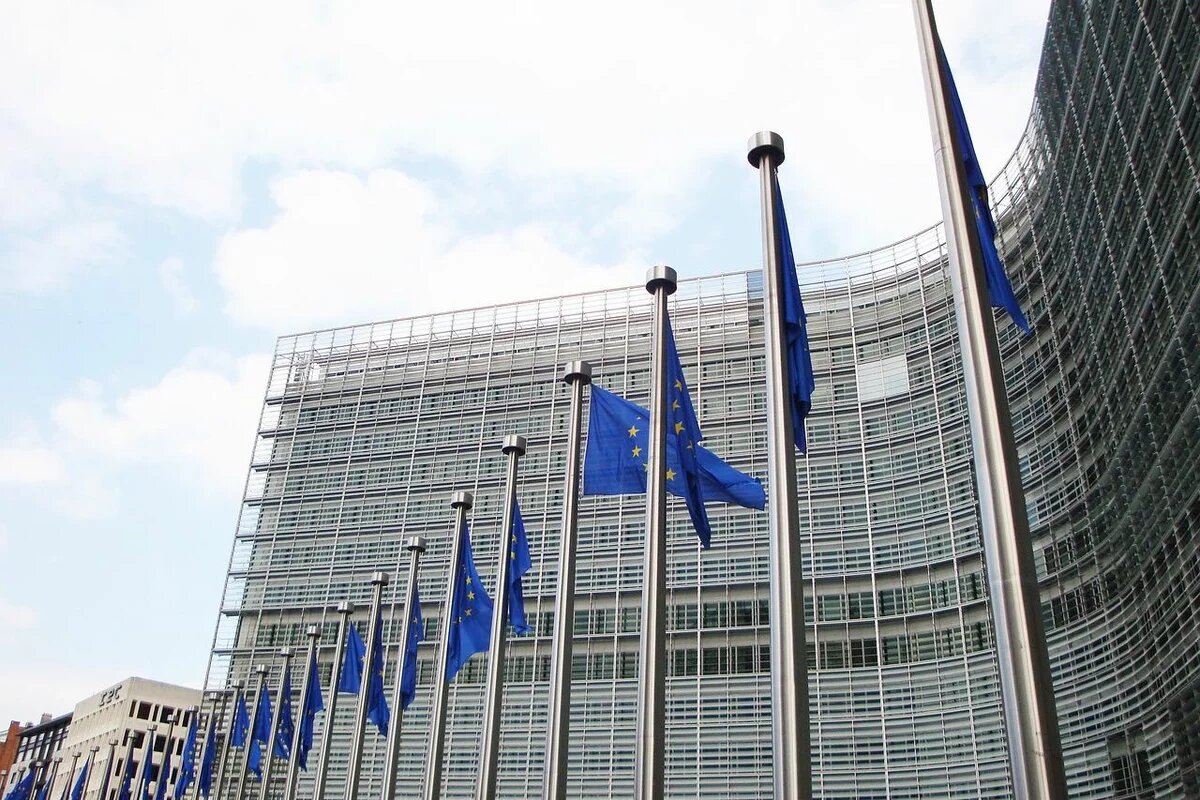On 6-9 June 2024, more than 400 million Europeans will be able to elect a new European Parliament. Five years after the European Green Deal was launched and in the midst of multiple crises, the economic strength and security of Europe are at stake. What lies ahead for the German and European economy? We discuss this with Sandra Parthie, Head of the Brussels Liaison Office at the German Economic Institute (IW), and Roderick Kefferpütz, Director of the EU Office of the Heinrich-Böll-Stiftung in Brussels.

Five years ago, the turnout for the European elections was historically high. Why should we be just as – if not more – interested in this year's elections?
Sandra Parthie: A lot has changed since 2019. Back then, there were already a number of specific plans under the heading of the European Green Deal, and after the election, an idea of how these could be implemented in the medium term. Then reality hit. Suddenly there was a pandemic, and two years later war on European soil with Russia as the aggressor, which until then had been one of the major suppliers of energy, especially for Germany. In this situation, it is all the more important to have a European Parliament and a European Commission that are committed to finding a joint solution to the challenges we're facing. What we don't need is a form of nationalism that is set on refusing to cooperate and running away from any problems.
Roderick Kefferpütz: We are facing enormous challenges. The next five years must set an important course for European defence capabilities and the green and digital transformation. To achieve this, we need a strong "responsibility coalition" of the political centre in the European Parliament. The good news is: Interest in the European elections is there, and the majority of people are convinced that we need answers from Europe and from the democratic centre.
The far right will likely see a large increase in the European Parliament in June. After a long period of silence, German businesses are now also clearly positioning themselves against this threat. Why would a right-wing populist economic policy at EU level also harm German companies?
Roderick Kefferpütz: The agenda of far-right parties, such as the AfD, is hostile to the economy and a threat to Germany as an industrial location. Take their core demand to leave the Euro, for example. The consequences would be new currency fluctuations, a loss of German competitiveness and a slump in exports. Economic institutes have calculated that leaving the euro would cost us 2.2 million jobs and a decline in economic output of up to 500 billion Euro. In addition, rejecting the digital Euro would also mean us falling behind the Chinese and Americans in the competition for digital currencies. An economic power like Germany cannot afford this.
Sandra Parthie: Last year, we also conducted a survey at the Institute among 119 chief executives of employers' associations in Germany. Half of them are already experiencing acute difficulties in attracting skilled workers from abroad for AfD stronghold areas. However, this is vital not only for our economy, but also for the efficiency of our social systems. Right-wing populist and far-right parties often use social rhetoric; however, their programmes would be harmful to most people and almost all companies. Incidentally, only people earning very high incomes would benefit from their tax policy demands.
In contrast, what are the really big questions that Europe needs to address in order to become more competitive and have the power to act again?
Sandra Parthie: We can see that investment in Europe is declining in comparison with other regions of the world. This is not a particularly good sign for the EU as a business location, which means we need to take action. We have to be careful not to fall behind when it comes to artificial intelligence and other future technologies. As Europe, we should continue to be able to develop and set standards in the future. As a continent that is not endowed with the same natural resources as other regions, we also need to look at how we can secure the resources we need to generate and supply energy. Protectionist tendencies in the USA and China are strong, which is highly problematic for us in Europe and Germany in particular, given that we are an export-oriented economy that is dependent on the supply of raw materials.
What does this increased pressure mean for the European Green Deal, the flagship project of the last European Commission and the central plan to make Europe a climate-neutral continent?
Roderick Kefferpütz: This is a fierce debate that is currently being waged in the EU: What's next for the EU Green Deal? We have a huge need for investment in the green and digital transformation. Mario Draghi says we need almost 500 billion Euro per year for this. But where will the economic growth come from to manage this transformation? Some are of the opinion that now is the time to put the EU Green Deal on ice and promote an "Industrial Deal" instead. That would be a mistake. We must not return to the old – false – belief that "the EU Green Deal has nothing to do with industry.
Otherwise we will fall behind, especially compared to the Americans and the Chinese. The USA has adopted the largest investment programme in history for the green transformation, with the Chinese also threatening to flood the European market with cheap green tech products. We must counter this and make industry more competitive through the green and digital transformation. To achieve this, however, the European Green Deal must be better supported by the right industrial policy measures. And there are a number of good suggestions.
When it comes to competitiveness, the buzzword ‘bureaucracy reduction’ is not far away.
Sandra Parthie: The need to make our way of consuming and producing much more sustainable is undisputed, at least among European economic players. The problem lies in the implementation. This was also based to a certain extent on the promise of cheap energy. With this situation changing over the last two years and the transformation now reaching companies primarily in the form of more bureaucracy and more reporting, we need to change tack. Because with more reporting obligations, I won’t have produced anything that is greener or consumed more sustainably. What's more: Due to the geopolitical situation, we want to diversify and go into countries that are not among our current partners – however, access to the majority of these countries is made more difficult for companies due to our high standards. We must not assume that we are the only players in this field. If supplier countries are unable to meet ever more comprehensive and stringent European requirements, they will look for other partners.
Roderick Kefferpütz: Of course, we all want to reduce bureaucracy. And there are many areas where we need to do more, for example with permits for wind turbines. It can sometimes take up to six years before you obtain one and finally start building. However, European reporting obligations do not exist just for the sake of it but are, rather, part of the system of economic, social and environmental risk management. And we are not alone in this. I'm thinking of the USA, where 13,000 Volkswagen cars were recently stuck and unable to access the American market. The cars violated US law, as they were partly manufactured using components produced in Xinjiang, where serious human rights violations are perpetrated in connection with the oppression of the Uyghurs.
This means that: Investments must be made. The EU essentially has two ways of responding to the need for investment: Mobilising private capital or using its own funds through European debt – this has been available for the first time since 2020 in the context of joint debt for the Next Generation EU programme. What's next for European investments?
Roderick Kefferpütz: This is a very controversial issue on which we urgently need to make progress. The need for investment is enormous, with the funding situation becoming increasingly difficult. The Next Generation EU Fund expires in 2026 and the rules of the Stability and Growth Pact, which were suspended during the pandemic and the war in Ukraine, will apply again. Completing the Capital Markets Union would be an important step in the right direction. In the EU, a total of 33 trillion Euro lies dormant in private savings. The gains would be huge if just a fraction of this could be mobilised for the capital market. But other answers must also be found. In fact, investment plans can be found in almost all of the European election manifestos presented by the German political parties. Green investments, investments for social issues, for defence. For this reason, I do not believe it's unrealistic for us to make progress on joint investments in the next European legislative period.
Sandra Parthie: The EU's own resources are at a notoriously low level. EU Member States have little interest in making more money available to the EU. If the EU now raises this money on the financial markets, it needs to think carefully about whether it wants to pay 10 billion Euro in interest every year, as is the case for the current EU debt burden, and who will pay this. A lot depends on the willingness to do more.
Are you confident about this willingness?
Sandra Parthie: The latest study on Europe by the Heinrich-Böll-Stiftung shows that there is support right across the EU for European integration and also for joint European investment projects. And we need to remind ourselves how much the single market increases our prosperity, even if we don't see this in our wallets every day. And we are in the process of improving Europe's position as a business location. In a world of increasing competition, we have to stand together, because we can't do it alone.
Roderick Kefferpütz: I can only agree with that. It's also an opportunity for the European Union to grow and grow together in the face of challenges. Who would have thought the reconstruction programme during the coronavirus pandemic with joint debt was possible a few years ago? Who would have thought that the EU would use the European Peace Facility to jointly send weapons to Ukraine? Times of crisis offer opportunities for political progress.
This interview was conducted by Phillip Käding, Head of Economic and Financial Policy.
The English version first appeared here: eu.boell.org
